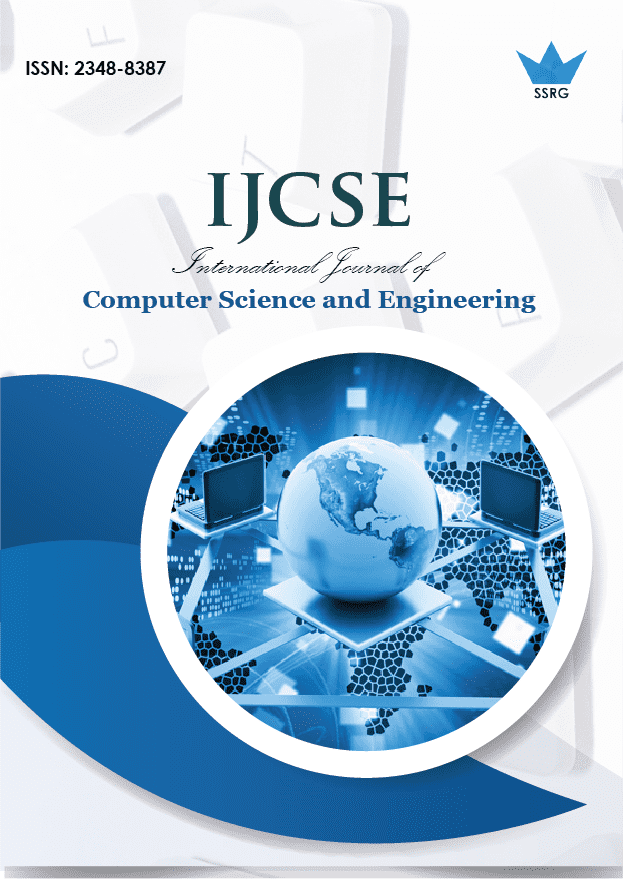ACO in e-Learning: Headed For an Adaptive Knowledge Conduit Method

| International Journal of Computer Science and Engineering |
| © 2016 by SSRG - IJCSE Journal |
| Volume 3 Issue 1 |
| Year of Publication : 2016 |
| Authors : Ashok babu, Balaji kadiravan |
How to Cite?
Ashok babu, Balaji kadiravan, "ACO in e-Learning: Headed For an Adaptive Knowledge Conduit Method," SSRG International Journal of Computer Science and Engineering , vol. 3, no. 1, pp. 1-4, 2016. Crossref, https://doi.org/10.14445/23488387/IJCSE-V3I1P101
Abstract:
nowadays we are in an epoch where extreme advancements in networking and in sequence technology are in exploit. The learning progression has also in use these advancements, as an outcome of which e-learning came to the prospect. Personalization in e-learning will advance the presentation of the system. Topical researches are absorbed on providing adaptableness to the knowledge administration systems, depending upon the varying user needs and contexts. Adaptability can be provided at different levels .Providing an adaptive learning path according to the situation of the learners’ is an imperative concern. An most advantageous adaptive learning path motivation help the learners in tumbling the cognitive overwork and incomprehension, and thereby improving the effectiveness of the Learning Management System (LMS). Ant Colony Optimization (ACO) is a broadly established practice since it provides an adaptive knowledge path to the learners. 3Meta-heuristic which is worn in intellectual tutoring systems provides the learning path in an adaptive approach. The most appealing attribute of ACO is its adaptation and toughness in surroundings where the learning equipment and learners are varying recurrently. In this paper we can have a look throughout the existing ACO approaches headed for providing an adaptive learning path and an introduction towards a superior attribute ant for construction the e-learning system more adaptive.
Keywords:
Adaptive learning path; ACO; e-Learning.
References:
1. Pushpa. M, ACO in e-Learning: Towards an adaptive learning path, International Journal on Computer Science and Engineering, Vol. 4 No. 03 March 2012.
2. Brusilovsky, P., Adaptive hypermedia. In Alfread Kobas (Ed.), User modeling and user adapted interaction. Ten year anniversary issue (Vol. 11, pp. 87–110), 2001.
3. Jeroen J. G. van Merriënboer Paul Ayres Research on Cognitive Load Theory and Its Design Implications for ELearning. ETR&D, Vol. 53, No. 3, 2005, pp. 5–13 ISSN 1042–1629
4. Jin-Cherng Lin; Kuo-Chiang Wu; Finding a Fitting Learning Path in E-learning for Juvenile; Seventh IEEE International Conference on Advanced Learning Technologies, 2007.
5. Kwasnicka, H, Szul, D, Markowska-Kaczmar, U, Myszkowski, P.B.; Learning Assistant - Personalizing Learning Paths in e- Learning Environments; Computer Information Systems and Industrial Management Applications, 2008.
6. Lopes RS, Fernandes MA, Adaptative instructional planning using workflow and genetic algorithms. In: Proceedings of the eighth IEEE/ACIS international conference on computer and information science, pp 87–92, 2009.
7. Samia A, Mostafa B Re-use of resources for adapted formation to the learner. In: Proceedings of the international symposium on computational intelligence and intelligent informatics (ISCIII), pp 213–217, 2007.
8. Feng-Hsu Wang, Personalized Recommendation for Webbased Learning Based on Ant Colony Optimization with Segmented-goal and Meta-Control Strategies; 2011 IEEE International Conference on Fuzzy Systems June 27-30, 2011.
9. Halina Kwasnicka, Dorota Szul, Urzula Markowska- Kaczmar, Pawel B, Myszkowski. “Learning Assistant – Personalizing learning paths in relearning environments.”7th Computer Information Systems and Industrial Management Applications. IEEE, 2008.

 10.14445/23488387/IJCSE-V3I1P101
10.14445/23488387/IJCSE-V3I1P101